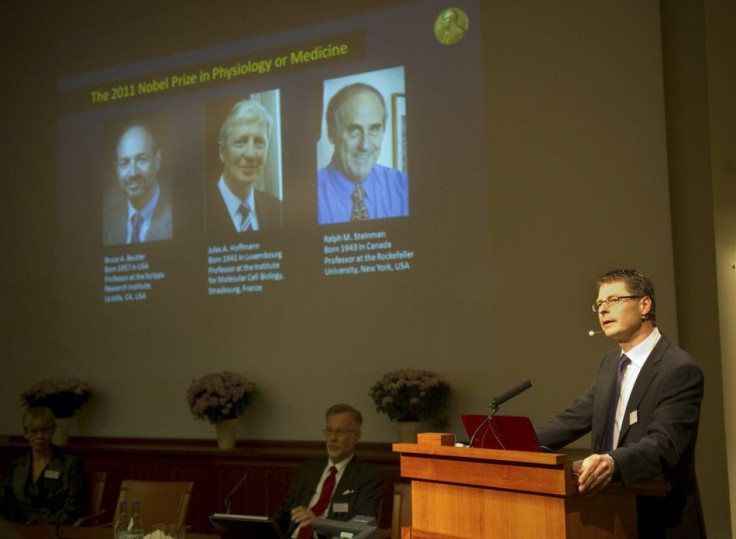Factbox: Winners of 2011 Nobel Medicine Prize

The 2011 Nobel Prize for Physiology or Medicine, was awarded on Monday to Bruce Beutler and Jules Hoffmann jointly for their discoveries concerning the activation of innate immunity and the other half to Ralph Steinman for his discovery of the dendritic cell and its role in adaptive immunity.
After the announcement, the Nobel panel, which does not make posthumous awards, said Steinman had died three days earlier.
The discoveries of the three Nobel laureates have revealed how the innate and adaptive phases of the immune response are activated and so provided novel insights into disease mechanisms. Their work has opened up new avenues for the development of prevention and therapy against infections, cancer and inflammatory diseases.
Here are some details on the winners:
* BRUCE BEUTLER
-- Beutler is credited with key discoveries that answered one of the most fundamental questions in immunology: the question as to how we sense infections when they occur.
-- Born in Chicago in December 1957. He received his B.A. from the University of California in 1976 and his M.D. from the University of Chicago in 1981.
-- From 1981 to 1983 he continued his medical training at the University of Texas Southwestern Medical Center at Dallas.
-- Between 1983 and 1985 he was Fellow at Rockefeller University of New York, where he became Assistant Professor in 1985. He was also Associate Physician at the Rockefeller University Hospital between 1984 and 1986.
-- Since 2000 he has been professor of genetics and immunology at The Scripps Research Institute, La Jolla, California
* JULES HOFFMANN
-- Hoffmann was born in Luxembourg in August 1941. As a student he moved to France and is a French citizen.
-- He graduated in Biology and Chemistry and received his Ph.D. in Biology from the University of Strasbourg, France, in 1963.
-- After postdoctoral training at the University of Marburg, West Germany, he returned to Strasbourg, where he headed a research laboratory from 1974 to 2009. He has also served as director of the Institute for Molecular Cell Biology in Strasbourg and during 2007-2008 as President of the French National Academy of Sciences.
-- As director of the laboratory, the interest of his group gradually moved to insect immunity. Hoffmann made his pioneering discovery in 1996, when he and his co-workers investigated how fruit flies combat infections.
* RALPH STEINMAN:
-- Canadian-born Steinman died on September 30, 2011, of pancreatic cancer, the prize-giving committee and the university where he worked said on Monday.
-- Steinman, 68, was the Henry G. Kunkel Professor at The Rockefeller University in New York and a senior physician at the university's hospital.
-- He was a cell biologist whose research has focused on the immune system, including the human immune system in the setting of several diseases.
-- Steinman's early research, conducted in collaboration with the late Zanvil A. Cohn at Rockefeller, began as an attempt to understand the primary white cells of the immune system.
-- Steinman was born in Montreal, Canada in January 1943. He studied biology and chemistry at McGill University, qualifying in 1963. He went on to study medicine and gained an M.D., magna cum laude, from Harvard Medical School in 1968.
-- After completing an internship and residency at Massachusetts General Hospital, he joined The Rockefeller University in 1970 as a postdoctoral fellow in their laboratory of Cellular Physiology and Immunology. He became professor of immunology there from 1988, and was also director of its Center for Immunology and Immune Diseases.
Sources: Reuters, nobelprize.org, www.balzan.org, www.shawprize.org, lab.rockefeller.edu
© Copyright Thomson Reuters 2024. All rights reserved.











